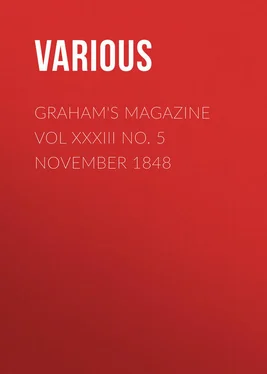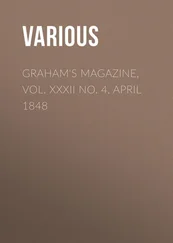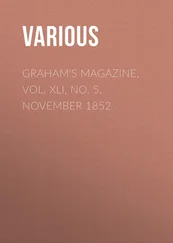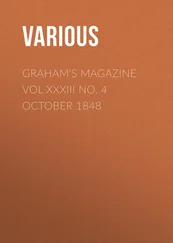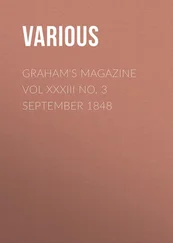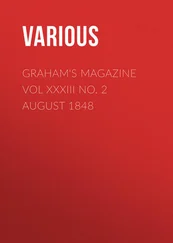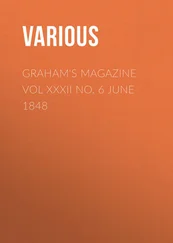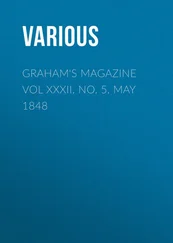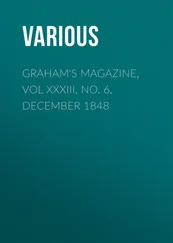Various - Graham's Magazine Vol XXXIII No. 5 November 1848
Здесь есть возможность читать онлайн «Various - Graham's Magazine Vol XXXIII No. 5 November 1848» — ознакомительный отрывок электронной книги совершенно бесплатно, а после прочтения отрывка купить полную версию. В некоторых случаях можно слушать аудио, скачать через торрент в формате fb2 и присутствует краткое содержание. Издательство: Иностранный паблик, Жанр: periodic, literature_19, foreign_edu, на английском языке. Описание произведения, (предисловие) а так же отзывы посетителей доступны на портале библиотеки ЛибКат.
- Название:Graham's Magazine Vol XXXIII No. 5 November 1848
- Автор:
- Издательство:Иностранный паблик
- Жанр:
- Год:неизвестен
- ISBN:нет данных
- Рейтинг книги:5 / 5. Голосов: 1
-
Избранное:Добавить в избранное
- Отзывы:
-
Ваша оценка:
- 100
- 1
- 2
- 3
- 4
- 5
Graham's Magazine Vol XXXIII No. 5 November 1848: краткое содержание, описание и аннотация
Предлагаем к чтению аннотацию, описание, краткое содержание или предисловие (зависит от того, что написал сам автор книги «Graham's Magazine Vol XXXIII No. 5 November 1848»). Если вы не нашли необходимую информацию о книге — напишите в комментариях, мы постараемся отыскать её.
Graham's Magazine Vol XXXIII No. 5 November 1848 — читать онлайн ознакомительный отрывок
Ниже представлен текст книги, разбитый по страницам. Система сохранения места последней прочитанной страницы, позволяет с удобством читать онлайн бесплатно книгу «Graham's Magazine Vol XXXIII No. 5 November 1848», без необходимости каждый раз заново искать на чём Вы остановились. Поставьте закладку, и сможете в любой момент перейти на страницу, на которой закончили чтение.
Интервал:
Закладка:
This was the language of a passion, which, however true, was equally unmeasured and imprudent. The friend of the unhappy lover would have held him back.
"It is all in vain, Giovanni! Think! my friend, you can do nothing now. It is too late; nor is there any power to prevent this consummation. Their names have been long since written in the 'Book of Gold,' and the Doge himself may not alter the destiny!"
"The Book of Gold!" exclaimed the other. "Ay, the 'Bride of Gold!' but we shall see!" And he again started forward. His kinsman clung to him.
"Better that we leave this place, Giovanni. It was wrong that you should come. Let us go. You will only commit some folly to remain."
"Ay! it is folly to be wronged, and to submit to it, I know! folly to have felt and still to feel! folly, surely, to discover, and to live after the discovery, that the very crown that made life precious is lost to you forever! What matter if I should commit this folly! Well, indeed, if they who laugh at the fool, taste none of the wrath that they provoke."
"This is sheer madness, Giovanni."
"Release me, Nicolo."
The kinsman urged in vain. The dialogue, which was carried on in under tones, now enforced by animated action, began to attract attention. The procession was moving forward. The high anthem began to swell, and Giovanni, wrought to the highest pitch of frenzy by the progress of events, and by the opposition of Nicolo, now broke away from all restraint, and hurried through the crowd. The circle, dense and deep, had already gathered closely about the altar-place, to behold the ceremony. The desperate youth made his way through it. The crowd gave way at his approach, and under the decisive pressure of his person. They knew his mournful history – for when does the history of love's denial and defeat fail to find its way to the world's curious hearing. Giovanni was beloved in Venice. Such a history as his and Francesca's was sure to beget sympathy, particularly with all those who could find no rich lovers for themselves or daughters, such as Ulric Barberigo. The fate of the youthful lovers drew all eyes upon the two. A tearful interest in the event began to pervade the assembly, and Giovanni really found no such difficulty as would have attended the efforts of any other person to approach the sacred centre of the bridal circle. He made his way directly for the spot where Francesca stood. She felt his approach and presence by the most natural instincts, though without ever daring to lift her eye to his person. A more deadly paleness than ever came over her, and as she heard the first sounds of his voice, she faltered and grasped a column for support. The Patriarch, startled by the sounds of confusion, rose from the sacred cushions, and spread his hands over the assembly for silence; but as yet he failed to conceive the occasion for commotion. Meanwhile, the parents and relatives of Francesca had gathered around her person, as if to guard her from an enemy. Ulric Barberigo, the millionaire, put on the aspect of a man whose word was law on 'change. He, too, had his retainers, all looking daggers at the intruder. Fortunately for Giovanni, they were permitted to wear none at these peaceful ceremonials. Their looks of wrath did not discourage the approach of our lover. He did not seem, indeed, to see them, but gently putting them by, he drew near to the scarcely conscious maiden. He lifted the almost lifeless hand from her side, and pressing it within both his own, a proceeding which her mother vainly endeavored to prevent, he addressed the maiden with all that impressiveness of tone which declares a stifled but still present and passionate emotion in the heart. His words were of a touching sorrow.
"And is it thus, my Francesca, that I must look upon thee for the last time? Henceforth are we to be dead to one another? Is it thus that I am to hear that, forgetful of thy virgin vows to Gradenigo, thou art here calling Heaven to witness that thou givest thyself and affections to another?"
"Not willingly, O! not willingly, Giovanni, as I live! I have not forgotten – alas! I cannot forget that I have once vowed myself to thee. But I pray thee to forget, Giovanni. Forget me and forgive – forgive!"
Oh! how mournfully was this response delivered. There was a dead silence through the assembly; a silence which imposed a similar restraint even upon the parents of the maiden, who had showed a desire to arrest the speaker. They had appealed to the Patriarch, but the venerable man was wise enough to perceive that this was the last open expression of a passion which must have its utterance in some form, and if not this, must result in greater mischief. His decision tacitly sanctioned the interview as we have witnessed. It was with increased faltering, which to the bystanders seemed almost fainting, that the unhappy Francesca thus responded to her lover. Her words were little more than whispers, and his tones, though deep, were very low and subdued, as if spoken while the teeth were shut. There was that in the scene which brought forward the crowd in breathless anxiety to hear, and the proud heart of the damsel's mother revolted at an exhibition in which her position was by no means a grateful one. She would have wrested, even by violence, the hand of her daughter from the grasp of Giovanni; but he retained it firmly, the maiden herself being scarcely conscious that he did so. His eye was sternly fixed upon the mother, as he drew Francesca toward himself. His words followed his looks:
"Have you not enough triumphed, lady, in thus bringing about your cruel purpose, to the sacrifice of two hearts – your child's no less than mine. Mine was nothing to you – but hers! what had she done that you should trample upon hers? This hast thou done! Thou hast triumphed! What would'st thou more? Must she be denied the mournful privilege of saying her last parting with him to whom she vowed herself, ere she vows herself to another! For shame, lady; this is a twofold and a needless tyranny!"
As he spoke, the more gentle and sympathizing spirits around looked upon the stern mother with faces of the keenest rebuke and indignation. Giovanni once more addressed himself to the maiden.
"And if you do not love this man, my Francesca, why is it that you so weakly yield to his solicitings? Why submit to this sacrifice at any instance? Have they strength to subdue thee? – has he the art to ensnare thee? – canst thou not declare thy affections with a will? What magic is it that they employ which is thus superior to that of love? – and what is thy right – if heedless of the affections of thy heart – to demand the sacrifice of mine ? Thou hadst it in thy keeping, Francesca, as I fondly fancied I had thine!"
"Thou hadst – thou hast! – "
"Francesca, my child!" was the expostulating exclamation of the mother; but it failed, except for a single instant, to arrest the passionate answer of the maiden.
"Hear me and pity, Giovanni, if you may not forgive! Blame me for my infirmity – for the wretched weakness which has brought me to this defeat of thy heart – this desolation of mine – but do not doubt that I have loved thee – that I shall ever – "
"Stay!" commanded the imperious father.
"What is it thou wouldst say, Francesca? Beware!" was the stern language of the mother.
The poor girl shrunk back in trembling. The brief impulse of courage which the address of her lover, and the evident sympathy of the crowd, had imparted, was gone as suddenly as it came. She had no more strength for the struggle; and as she sunk back nerveless, and closed her eyes as if fainting under the terrible glances of both her parents, Giovanni dropped her hand from his grasp. It now lay lifeless at her side, and she was sustained from falling by some of her sympathizing companions. The eyes of the youth were bent upon her with a last look.
Читать дальшеИнтервал:
Закладка:
Похожие книги на «Graham's Magazine Vol XXXIII No. 5 November 1848»
Представляем Вашему вниманию похожие книги на «Graham's Magazine Vol XXXIII No. 5 November 1848» списком для выбора. Мы отобрали схожую по названию и смыслу литературу в надежде предоставить читателям больше вариантов отыскать новые, интересные, ещё непрочитанные произведения.
Обсуждение, отзывы о книге «Graham's Magazine Vol XXXIII No. 5 November 1848» и просто собственные мнения читателей. Оставьте ваши комментарии, напишите, что Вы думаете о произведении, его смысле или главных героях. Укажите что конкретно понравилось, а что нет, и почему Вы так считаете.
